The Emoji Company, launched just three years ago, is now taking licensed products to every corner of the globe.
April 6, 2018
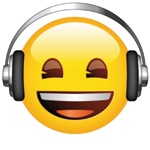
The Emoji Company, launched just three years ago, is now taking licensed products to every corner of the globe.
Marco Hüsges saw an opportunity and he took it.
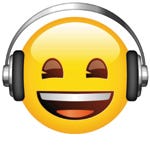
In 2013, Hüsges founded The Emoji Company on the trademark ownership of the term "emoji"–you know, those pictographs you use a million times a day when texting? As it turned out, no one had optioned the term yet, only the proprietary images that are encoded in mobile operating systems is under protected patent. But the term itself? Up for grabs.
Armed with some fierce entrepreneurial spirit, Hüsges built The Emoji Company and its 2,600-image strong library of vectorized icons to become the visual and product representation of the term, available for licensing in all categories.
"I always loved to communicate via those small icons on my phone," says Hüsges, who serves as the company's chief executive officer. "I thought it would be great to create an expressive and powerful brand that would solely concentrate on using icons to communicate with its customers. Using pictographs doesn't have any boundaries or language barriers and is the perfect way to communicate and to express ourselves. While the whole world goes digital, we wanted to transport iconic feelings and emotions back into the analogue world to create meaningful physical and tangible products under one umbrella brand."
As of today, Hüsges has secured the trademark to the term "emoji" in more than 60 countries including the U.S., Canada, Japan, South Korea, China, Hong Kong, Singapore, India, Brazil, Mexico, Chile, Argentina, Colombia, Russia, Israel, New Zealand, Australia, Thailand, Iran, South Africa and Egypt.
With an eye toward licensing and merchandising, Hüsges also built a strong network of global agents to help extend the brand to the varied territories. Throughout the world, the official Emoji brand is represented by agencies such as Global Merchandising Services in the U.S. and the U.K., Bavaria Media in G/A/S and Benelux, Big Merchandise in South Africa, Exim Licensing in Latin America, Haven Licensing in Australia and New Zealand, Medialink in China and Universal Music in Spain, Portugal, France, Italy, Russia, Turkey and Greece.
Now, with the IP secured and a global agent network in place, Hüsges and The Emoji Company are beginning to roll out the first consumer product programs in all territories.
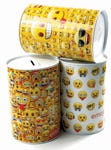
"Overall, 2016 has been an exciting year so far," says Hüsges. "When we started [officially licensing and building a consumer product program] last year, we were at the very beginning and took a relatively small booth at Las Vegas' Licensing Expo. But after the show, everything picked up speed. Immediately we signed 12 agents for representation, and now the Emoji brand is represented in more than 60 countries around the world. Within a short time frame, we have signed close to 100 licensees from many countries globally and across all categories."
The concept–seemingly so obvious–was not one that had been implemented yet at retail in any structured way, and it became very clear that consumers of all ages and nationalities were eager to wear, decorate and cook with Emoji-branded product. After all, more than half of all adults in the world own a smartphone, according to The Economist, and by 2020, it's projected that that number will top 80 percent. That's a lot of people who are now, then, intimately familiar with the Emoji brand by halo effect.
"The Emoji brand is one of the most unique and universal licenses," says Barry Drinkwater, chief executive officer, Global Merchandising Services, which manages the brand in the U.S., the U.K., Ireland and India. "It's not gender-specific and it's not age-specific–I don't think there's ever been anything like it. The brand has legs for a long time."
Licensees began to come on board as soon as the brand was up and running.
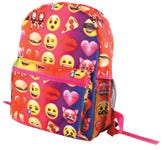
"In the beginning we had to convince people that the Emoji brand was a license they needed to take," says Drinkwater. "But when we showed licensees that there were these unique graphics available, it suddenly became real. The Emoji brand is not a movie or pop group or TV series–it's something in the digital world and not the physical. I think licensees thought that they could just go ahead and execute [the concept] on their own, but what they didn't realize was that Marco owns the family of Emoji trademarks."
Early adopters of the brand in the U.S. include more than 19 partners such as Sakar for electronics, FAB Accessories for gifting, Jay Franco for housewares, Unique for paper products, LF USA for sleepwear and Bentex for sportswear, among many others.
In the U.K., the licensee roster is equally as robust with Specsavers on board for eyewear, Ravensburger for toys and games, Coneen and Misirli for nightwear, Dreamtex for homewares, Wow Stuff for gifting, Danilo for paper products and many more.
And retailers have been receptive to the Emoji brand as well, once they realized its major potential.
"One of the first licensees that came on board for the Emoji brand was Sakar, which began launching electronics exclusively at Toys 'R' Us in the U.S. in October 2015," says Mary Kean, licensing director, U.S., Global Merchandising Services. "Slowly we've built up a program that is now starting to take off at retail. July is a target date and when we will start seeing Emoji product expand in the U.S. to retailers such as Walmart, Bed, Bath & Beyond, Kohl's and Target. It's been an incredible reaction in the U.S. at retail."
Jens Drinkwater, licensing manger, Global Merchandising Services, echoes Kean.
"In the U.K., we've had a similar first experience with licensees and retailers that the U.S. did," he says. "Emoji is a language that allows people to communicate, and the breadth of the assets that it has is very important. Not only do we have something that is identifiable across multiple age groups, but it is also appealing because the images travel around the world and people everywhere are aware of what they mean and what they stand for."
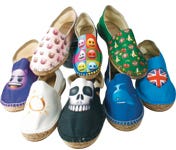
In the U.K., major mass retailers such as Argos, Asda, Boots, John Lewis, Primark, Tesco and Topshop have taken on Emoji product.
"I have never seen such creative minds come together," says Kean. "The licensed items that are coming out into the marketplace are some of the most fun items I have seen in a very long time, and I think the retail sales are showing that customers are reacting well to it."
And clearly the brand is not just for the U.S. and the U.K.–it's appeal and marketability is markedly global. According to Hüsges, this year and into 2017, retail around the globe will see hundreds of SKUs roll out, perhaps even thousands.
"A typical brand will build up in a particular country and then slowly work its way around the world," says Hüsges. "But Emoji, to be quite honest, is the opposite. It's everywhere at the same time. You don't have to hold back on certain markets."
Other markets that are performing well for the Emoji brand include Spain, Portugal, France, Germany, Mexico, Brazil and Colombia.
"We are not building The Emoji Company for the short term and to create opportunistic business–this can really be an evergreen brand," continues Hüsges.
Categories for the brand are also wide reaching, with no clear leader in any market, but of course, says The Emoji Company team, apparel is a strong performer. The brand is available across apparel categories such as outerwear, sleepwear, underwear, footwear, bags and backpacks and automotive accessories, but also includes categories such as bed linens, stationery, personal care, confectionery, toys and plush, party goods and more.
Promotions are also a well-performing piece of business for the brand.
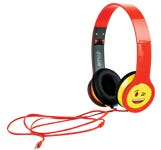
"Promotions are something we are doing all over the world, and heavily in the U.S. and Mexico," says Hüsges. "We have licensed our icons for commercials as well, including a leading phone company in Germany. The great thing about the Emoji brand is that it can be used for consumer products but also promotions and advertising purposes–it's a unique prospect to be able to use one single brand across such diverse purposes."
The future, then, is very bright for The Emoji Company.
An Emoji TV series and online game are also in the works, a logical next step for the brand and for Hüsges, who also holds the entertainment rights and who has worked in the gaming and animation industry for more than 20 years.
"Right now we have 135-plus licensees and are currently working on very big global partnerships, so the aim is to manage the potential of the brand and build quality, expressive products that meet retail demand and eventually move the brand into other price models and categories while expanding into other markets like Eastern Europe and Russia," says Hüsges.
Read more about:
EmojiExim LicensingGlobal Merchandising ServicesHaven LicensingmedialinkThe Emoji CompanyUniversal Music GroupYou May Also Like






